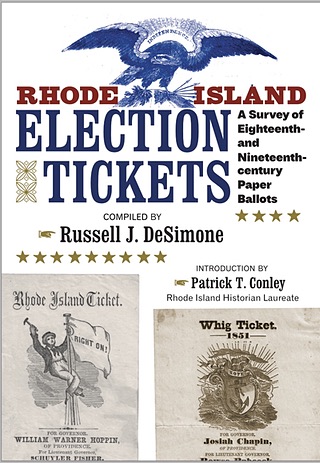
Rhode Island Election Tickets: A Survey of Eighteenth- and Nineteenth-century Paper Ballots
Russell J. DeSimone
Rhode Island Election Tickets shows images of more than two hundred and fifty paper ballots, providing the reader with a look at how Rhode Islanders voted for nearly one hundred and fifty years. It covers the colonial period, the anti-Masonic factions of the 1830s, the Law & Order coalition following the Dorr Rebellion of 1842, special interest in elections during the 1850s with the advent of the temperance movement, pro-Union tickets during the 1860, and during the 1870s and 1880s with the emergence of the Greenback and Prohibitory factions. All tickets shown have a short description of the election and its candidates.
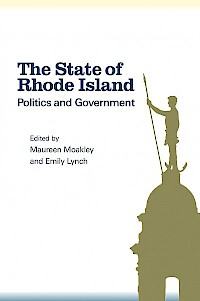
The State of Rhode Island: Politics and Government
Maureen Moakley & Emily Lynch
In The State of Rhode Island: Politics and Government, scholars and experts at universities and organizations across the Ocean State provide an engaging analysis of current issues in chapters and essays on the political institutions, public policy, and political behavior in Rhode Island. This book is meant for a wide audience, including students, political actors, and interested general readers.
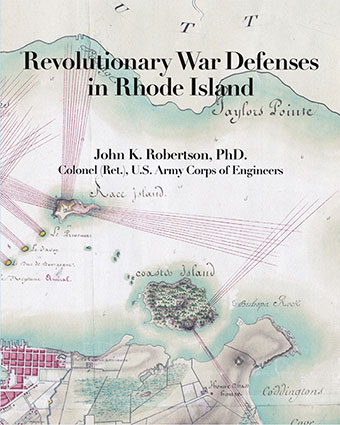
Revolutionary War Defenses in Rhode Island
John K. Robertson, PhD.
The remnants of forts we see in Rhode Island today are the remains of American, British, and French periods of fort building. In many cases a British fort replaced an American fort and was replaced by a French fort. Revolutionary War Defenses in Rhode Island updates Edward Field’s and George Cullum’s work on Rhode Island forts produced in the late 1800s. This book covers American, British and French fortifications within the state and includes almost 300 maps and plans, including 9 period maps in color. It is designed as a reference book, and while it tells part of the story of the war in Rhode Island, it doesn’t tell the whole story — something Robertson hopes to accomplish in his future writings.

Island Girl: The Life of Justice Florence Kerins Murray; Patriot, Public Servant, Esteemed Jurist
Marian Mathison Desrosiers
In her youth Florence Kerins Murray (1916–2004) saw the expansion of women’s suffrage rights, a world-wide depression, and war. She served the nation in the Women’s Army Corps and became a respected military officer during World War II. After the war Murray ran for the school committee and the state senate; in those positions she demonstrated her energy and abilities, as she did in her next jobs as Rhode Island trial court judge and supreme court judge. For more than forty years she made decisions on constitutional rights of citizens of Rhode Island and provided leadership in jurist organizations at the national level.
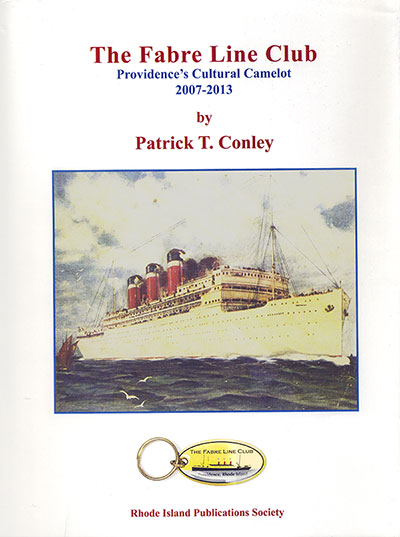
The Fabre Line Club: Providence’s Cultural Camelot, 2007–2013
Patrick T. Conley
For a few brief shining years in the early part of this millenium, Dr. Patrick T. Conley’s “Camelot” on Allens Avenue in Providence hosted a Rectangular Table of historians, literati, and ordinary bedrock citizens of the Ocean State. Dubbed “The Fabre Line Club” in commemoration of the immigrants who debarked Fabre Line ships onto the Allens Avenue docks, the club presented lectures, cultural events, and entertainments both edifying and amusing to audiences from all walks of life — not to mention ethnic heritage buffets and dinners with a view of the harbor. Like Arthur’s court, the Fabre Line Club also vanished into legend, but lives on in this joyous and melancholy saga of seven years of culture, politics, and good times on the waterfront.
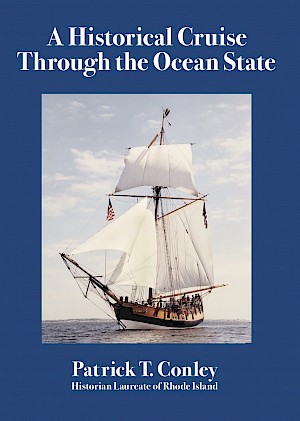
A Historical Cruise Through the Ocean State
Dr. Patrick T. Conley
This book, Patrick Conley’s thirty-first and his fourth anthology of Rhode Island historical essays, analyzes, like his previous collections, a diversity of Rhode Island topics. Most useful to the student of Rhode Island history are the three introductory essays. The first is a lengthy survey of the state’s history written for its 350th anniversary in 1986; the second describes in detail the factors that dramatically transformed Rhode Island from a Republican to a Democratic state (1920–1940); and the third is a local morale booster outlining Rhode Island’s eight major contributions to the formation of the United States (1636–1791).
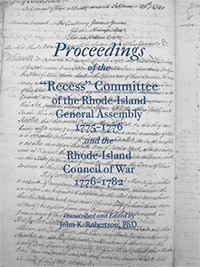
Proceedings of the “Recess” Committee of the Rhode-Island General Assembly 1775–1776 and the Rhode-Island Council of War 1776–1782
John K. Robertson, PhD.
During the Revolutionary War, each of the thirteen colonies/states established a committee to carry on essential war-related functions during the recess of their respective assembly. In Rhode Island they tried an “On-call” committee, which J. K. Robertson calls the “Recess” Committee, that met in 1775 and 1776. This did not function well during the period leading up to the British invasion in December 1776. It was replaced with a standing committee called the Council of War, which met from just after the British arrived until April of 1782. This volume contains the proceedings of both bodies. Together, the Records of the Assembly and these Proceedings provide a true legislative record for the period.
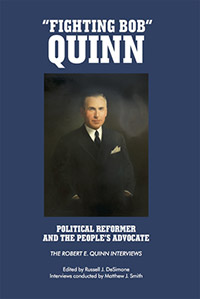
“Fighting Bob” Quinn: Political Reformer and People’s Advocate
Russell J. DeSimone, editor
Robert Emmet Quinn (1894–1975) served Rhode Island and the nation in a variety of positions. As West Warwick’s state senator to the General Assembly he helped lead the Democratic senate filibuster of 1924; as lieutenant governor he was the chief architect of the Bloodless Revolution of 1935; and as governor he called out the state militia in 1937 in what would come to be known as the Race Track War. Appointed a justice to the Rhode Island Superior Court in 1941, he served in that capacity until he was appointed the first chief judge of the newly formed United States Court of Military Appeals by President Harry S. Truman in 1951. Judge Quinn would serve on this court until just before his death in 1975. He also served as a naval officer during both world wars.
The audio interviews conducted by historian and former House Speaker Matthew Smith in 1972 and published here for the first time provide a fascinating firsthand account of Rhode Island political intrigue, election fraud and ballot stealing, ethnic politics and legislative reforms during the first half of the 20th century — topics that are still relevant today.
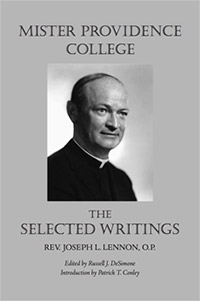
Mr. Providence College: The Selected Writings of Rev. Joseph L. Lennon, O.P.
Rev. Joseph L. Lennon, O.P.
A careful reading of these essays, drawing as they do, upon the wisdom of a vast array of philosophers, theologians, scientist, poets, scholars, social critics, historians, jurists, statesmen, and literati, could convince one that this volume could also be titled Father Lennon’s Mother Lode, because it is a goldmine of insights and contains rich veins of practical, intellectual, and spiritual guidelines for life, both here and hereafter.
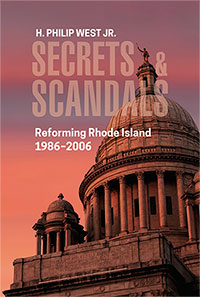
Secrets & Scandals: Reforming Rhode Island 1986–2006
H. Philip West Jr.
Secrets & Scandals tells the inside story of events that shook Rhode Island’s culture of corruption, gave birth to the nation’s strongest ethics commission, and finally brought separation of powers in 2004. No single leader, no political party, no organization could have converted betrayals of public trust into historic reforms. But when citizen coalitions worked with dedicated public officials to address systemic failures, government changed.
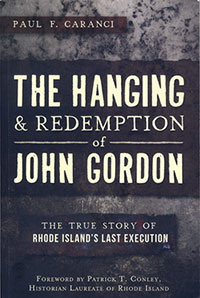
The Hanging & Redemption of John Gordon: The True Story of Rhode Island’s Last Execution
Paul F. Caranci
On a frigid day in 1813, Amasa Sprague, a wealthy Yankee mill owner, left his mansion to check on his cattle. On the way, he was accosted and beaten beyond recognition, and his body was left facedown in the snow. What followed was a trial marked by judicial bias, witness perjury and societal bigotry that resulted in the conviction of twenty-nine-year-old Irish Catholic John Gordon. He was sentenced to hang. Despite overwhelming evidence that the trial was flawed and newly discovered evidence that clearly exonerated him, an anti-Irish Catholic establishment refused him a new trial. On February 14, 1845, John Gordon became the last victim of capital punishment in Rhode Island. Local historian Paul F. Caranci brings this case to life, graphically describing the murder and exposing a corrupt judicial system, a biased newspaper and a bigoted society responsible for the unjust death of an innocent man.
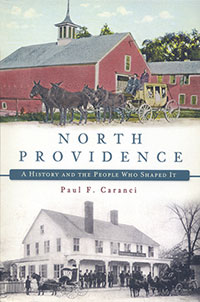
North Providence: A History and the People Who Shaped It
Paul F. Caranci
It was a sanctuary for religious dissenters and the birthplace of industrial giants.
In 1765, settlers to the west of Providence petitioned to form their own township. Their prayers were answered, and North Providence, Rhode Island, was born. While it sheltered religious dissenters, North Providence was also the sparking point of the Industrial Revolution — native sons and industrialists Samuel Slater and Zacariah Allen reinvented the cotton industry and altered the course of the nation. In this history of North Providence, author PFC celebrates the town’s colorful characters and provides walking tours for the villages of Lymansville, Allendale, Centredale and Fruit Hill. Learn how North Providence native Stephen Olney became a Revolutionary War hero when he pulled an injured James Monroe from the battlefield and how Frank C. Angell became a spokesman for Centredale. Caranci reveals the unique history of North Providence and the people who shaped it.
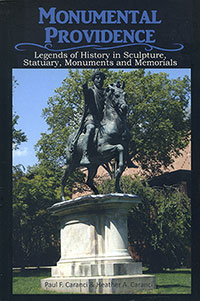
Monumental Providence: Legends of History in Sculpture, Statuary, Monuments and Memorials
Paul F. Caranci & Heather A. Caranci
One could argue convincingly that our local public art is underappreciated or simply unnoticed, but Paul F. Caranci, Rhode Island’s Deputy Sectretary of State and the author of three books on local history, in collaboration with his daughter Heather, seek to change that perception by raising the profile of the public art that surrounds us.
The Carancis’ Monumental Providence can be enjoyed both as a casual read and as a useful guide during a walking tour of the Downtown and its surrounding neighborhoods. — Paul R. Campbell, Archivist, City of Providence
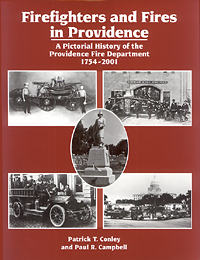
Firefighters and Fires in Providence:
A Pictorial History of the Providence Fire Department 1754–2001
Patrick T. Conley and Paul R. Campbell
“This book, one of the few of its kind, traces the history of firefighting in a major American city from the mid-eighteenth century to the present. In 50,000 words and 200 carefully selected photos authors Patrick T. Conley and Paul R. Campbell trace the history of the Providence Fire Department for twenty-three decades. . . . Here is a book for firefighters, fire buffs, urban historians, and all those general readers who like a colorful, nostalgic tale well told. In this work the proud heritage of the Providence Fire Department will be preserved forever.”
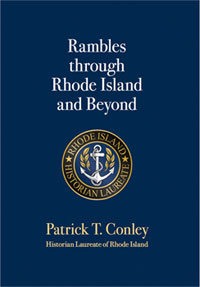
Rambles through Rhode Island and Beyond
Patrick T. Conley
This well-illustrated book, the author’s 29th and his third anthology, consists of 38 diverse essays. Although most of these are Rhode Island-oriented, in Part 5 of this volume Conley expands his field of vision to include chapters on ethnicity, nature, abortion, banking, and the philosophy of history.
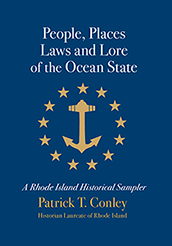
People, Places, Laws, and Lore of the Ocean State
Patrick T. Conley
This volume contains forty-six essays on various subjects and of varying lengths by Rhode Island’s first Historian Laureate, Patrick T. Conley. The beginning section (“People”) contains not only profiles of individuals, but also profiles of Rhode Island’s major immigrant groups. Part Two (“Places”) provides vignettes of neighborhoods, institutions, and historic homes and sites, especially those in Providence and Bristol, the communities where the author resided for most of his life. Part Three (“Laws”) deals mainly with the state constitution in all its ramifications and with state statutes that have provoked either controversy or acclaim when enacted. Part Four (“Lore”) contains a potpourri of short essays on such topics as the relationship of George Washington and John F. Kennedy with Rhode Island, slavery in the Ocean State, and the author’s long battle with the Providence Journal.
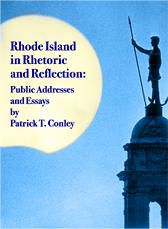
Rhode Island in Rhetoric and Reflection: Public Addresses and Essays by Patrick T. Conley
“These are wonderful essays on the history of Rhode Island by the premier historian of Rhode Island. With wit, clarity, and an extraordinary command of historical information, Patrick T. Conley has covered all aspects of Rhode Island history from its earliest origins in the seventeenth century to the beginning of the twenty-first century. There are essays on Rhode Island constitutionalism (Conley’s specialty), on immigration and ethnicity, on Rhode Island sports, on Catholicism, and on a wide variety of the Ocean State’s local scenes and colorful characters. The beauty of collections like this is that they preserve what otherwise might be lost. And Conley’s writings are worth preserving. He is a treasure.”
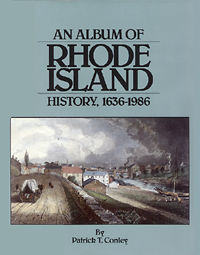
An Album of Rhode Island History, 1636–1986
Patrick T. Conley
This volume — containing a crisply-written narrative of over 100,000 words and more than 400 representative illustrations — is the contribution of Dr. Patrick T. Conley and WLNE-TV6 to Rhode Island’s 350th anniversary observance. Dr. Conley, generally regarded as the foremost authority on Rhode Island’s history, has taught and researched in this field for more than forty years. This book is the fruit and the distillation of that scholarly commitment.
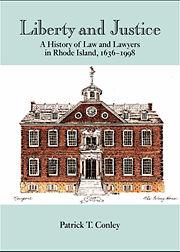
Liberty and Justice: A History of Law and Lawyers in Rhode Island, 1636–1998
Patrick T. Conley
The foremost authority on Rhode Island’s history has written a volume to commemorate the 100th anniversary of the Rhode Island Bar Association that lawyers and history buffs will cherish — the trials and banishment of Roger Williams and Anne Hutchinson for their religious views, the condemnation of four whites for the murder of an Indian, the execution of 26 pirates on Goat Island, the investigation into the burning of the Gaspee, the rejection of the federal Constitution, divorce in the late 18th century, the Dorr War, the Gordon murder trial, the Industrial Revolution’s impact on the development of the law of negligence, the Bloodless Revolution, the Race Track War, the Long Count of 1956 — it’s all here, in 526 pages with 207 captioned illustrations in a limited edition of 1,500 copies.
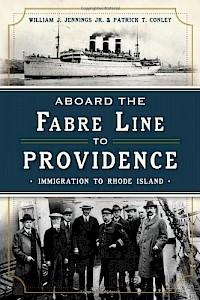
Aboard the Fabre Line to Providence: Immigration to Rhode Island
William J. Jennings Jr. & Patrick T. Conley
In an era when immigration was at its peak, the Fabre Line offered the only transatlantic route to southern New England. One of its most important ports was in Providence, Rhode Island. Nearly eighty-four thousand immigrants were admitted to the country between the years 1911 and 1934. Almost one in nine of these individuals elected to settle in Rhode Island after landing in Providence, amounting to around eleven thousand new residents. Most of these immigrants were from Portugal and Italy, and the Fabre Line kept up a brisk and successful business. However, both the line and the families hoping for a new life faced major obstacles in the form of World War I, the immigration restriction laws of the 1920s, and the Great Depression. Join authors Patrick T. Conley and William J. Jennings Jr. as they chronicle the history of the Fabre Line and its role in bringing new residents to the Ocean State.
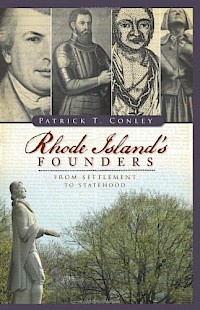
Rhode Island’s Founders: From Settlement to Statehood
Patrick T. Conley
Dr. Patrick T. Conley, Rhode Island’s preeminent historian, journeys with us to early America, where Rhode Island’s founders laid the groundwork for America’s policy of religious freedom. Learn what led Roger Williams to write The Bloudy Tenent of Persecution and discover how James Franklin, older brother of Benjamin, left a lasting impact on the future of American publishing. Find out why Mary Dyer fought for her religious beliefs until she became one of the “Boston martyrs”; how Anne Hutchinson overcame a male-dominated society to allow women the right to preach and teach; and how General Nathanael Greene helped to liberate the South during the American Revolution. These colorful biographies of political, military and religious leaders, artists and craftsmen, scientists and philanthropists illuminate the beginning of America’s smallest state, but one that has always exhibited remarkable diversity.
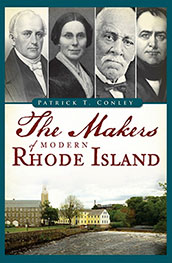
The Makers of Modern Rhode Island
Patrick T. Conley
Picking up where Rhode Island’s Founders left off, Dr. Patrick T. Conley, Rhode Island’s preeminent historian and president of the Rhode Island Heritage Hall of Fame, takes us through the Ocean State’s history from 1790 to 1860. Learn how Samuel Slater, the so-called Father of the Factory System, pioneered the making of modern Rhode Island, how Elizabeth Buffum Chace founded the Rhode Island Women’s Suffrage Association and what political circumstances led Governor Thomas Wilson Dorr to the Dorr War in 1842. This volume includes colorful biographical sketches of fifty-six influential Rhode Islanders who helped shape the state’s urban and industrial development into the modern Rhode Island of today.
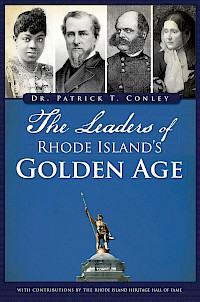
The Leaders of Rhode Island’s Golden Age
Patrick T. Conley
Picking up where The Makers of Modern Rhode Island left off, Dr. Patrick T. Conley, president of the Rhode Island Heritage Hall of Fame, takes us through the golden age of the state’s history, from 1861 to 1900. It was during this period that Rhode Island played a leadership role in the Industrial Revolution. From military leaders like General Ambrose Burnside to social reformers such as Sarah Elizabeth Doyle and architects Charles F. McKim and Stanford White, they ensured that the state’s contributions to the nation would never be forgotten. This volume includes more than one hundred biographical sketches of influential Rhode Islanders who helped make this brief span of time the greatest in the state’s history.
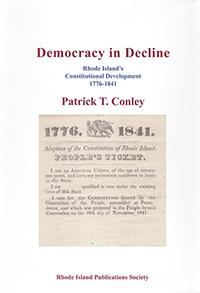
Democracy in Decline: Rhode Island’s Constitutional Development, 1776–1841
Patrick T. Conley
The State of Rhode Island and Providence Plantations has a history of constitutional troubles. Until the “Dorr Rebellion” of 1842, Rhode Island pursued its sovereign way under the charter granted to it, as an English colony, in 1663 by King Charles II. But by 1842 many of the charter’s provisions were either obsolete or fraught with risk.
The whole story is compounded of countless strands, and there are pamphlets and polemics galore on one or another legal and constitutional aspect of the 206 years (1636 to 1842) that elapsed between the landing of Roger Williams on the Seekonk River shore and the emergence of the frustrated leader of Dorr’s Rebellion, Thomas Wilson Dorr.
Professor Patrick T. Conley of Providence College has taken these multiple strands and woven them into a comprehensive and scholarly whole. The story illustrates many a poignant moral. Thus the occasional bigotry and constant political blindness of many, if not most, of our colonial and state figures during the years in question, are depressing. There were only a few political and community leaders who rose above the egocentric and mercenary demands of their particular social class or political group. Moreover, those to whom the last fifty years are a vivid memory can testify that the earlier record has not been discernibly improved.
Professor Conley’s book informatively describes Rhode Island’s first halting steps along the cobblestoned road of constitution-making while brilliantly elucidating the problems involved in what is, almost always, an intricate and laborious process. It is a tract for the times from which the citizens and rulers of Rhode Island may greatly profit.
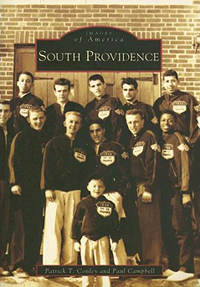
South Providence
Patrick T. Conley and Paul Campbell
The themes of South Providence — urbanization, immigration, and industrialization — best characterize the nation’s modern development. This volume reveals how a well-known Providence community worshipped, studied, worked, played, ate, and drank. The denizens of South Providence were an extraordinary mix. The geographic and demographic developments of the 19th century crafted the economically diverse, dense, and multicultural community of the 20th century. Today almost every major avenue still contains a varied mixture of residential, commercial, industrial, and institutional uses.
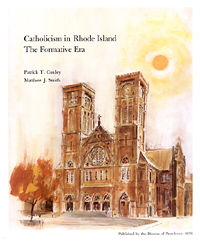
Catholicism in Rhode Island: The Formative Era
Patrick T. Conley and Matthew J. Smith
This volume — a contribution by the diocese to the state’s bicentennial observance — attempts to relate the history of Rhode Island Catholicism from its colonial origins down to the formal establishment of the Diocese of Providence in 1872. This is meant to be a ‘popular’ history designed for the general reader who wishes to know more of our state’s early Catholic heritage, but it is our hope that the book can be adapted for use in our schools.
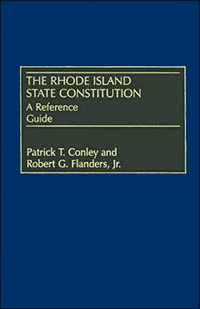
The Rhode Island State Constitution: A Reference Guide
Patrick T. Conley and Robert G. Flanders
The historical evolution of the Rhode Island Constitution is outlined in this comprehensive volume. Each section of the Rhode Island Constitution is analyzed completely. The authors also offer a detailed historigraphical essay as a guide to further research and study. Any student and practitioner of Rhode Island constitutional development will understand the importance of such a thorough study.
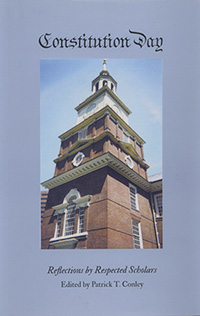
Constitution Day
Patrick T. Conley, editor
Constitution Day is an anthology of twelve diverse and original essays on American constitutional themes by highly respected constitutional scholars. Among the original thirteen colonies, self-governing Rhode Island was the only state to boycott the Philadelphia convention and the last to ratify the federal Constitution. It offered no apology for its conduct. Many of the scholars herein give their Rhode Island audience a good-natured ribbing while expounding their broader views, and editor Pat Conley appends his “Rhode Island Reflection” to each essay.
But the volume itself transcends the narrow confines of Conley’s “microparadise” to deal with a wide and significant range of constitutional issues: the origin and rationale of written constitutions; judicial review and judicial independence; the process of constitutional construction, ratification, and amend=ment; the impact of state and local issues on certain provisions of the federal Constitution; popular sovereignty; federal theory; presidential power; and the role of religion, race, and nativity in American constitutional development. Viewed from these perspectives, Constitution Day is both timely and timeless.
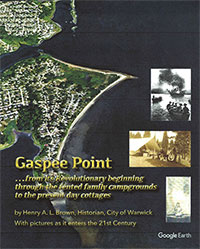
Gaspee Point . . . from its Revolutionary beginnings through the tented family campgrounds to the present day cottages
Henry A. L. Brown, Historian, City of Warwick
From the earliest times, this point of land extending into Narragansett Bay has had historic significance and brought recreational joy to hundreds, perhaps thousands, of Rhode Islanders. From the burning of the HMS Gaspee in 1772 to the tented campgrounds of the 20th century and cottages of the 21st century, Gaspee Point has been a special place in our hearts. Warwick historian Henry A. L. Brown digs into his treasure trove of collected memorabilia to tell the saga of Gaspee Point in words and pictures.
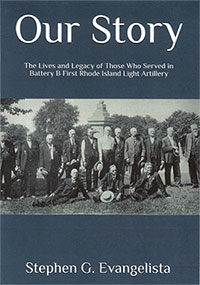
Our Story: The Lives and Legacy of Those Who Served in Battery B First Rhode Island Light Artillery
Steven G. Evangelista
Read about the artillerist who predicted his own death. Discover the father and son who served together. Meet the brothers who fought against each other. Learn about the officer who narrowly escaped death and thanked the man who nearly killed him. And unearth a hero whose grave was lost for more than three decades.
These are some of the true stories behind the brave men who fought with Battery B First Rhode Island Light Artillery.
Each chapter is dedicated to a different soldier and contains historical photos, documents and letters.